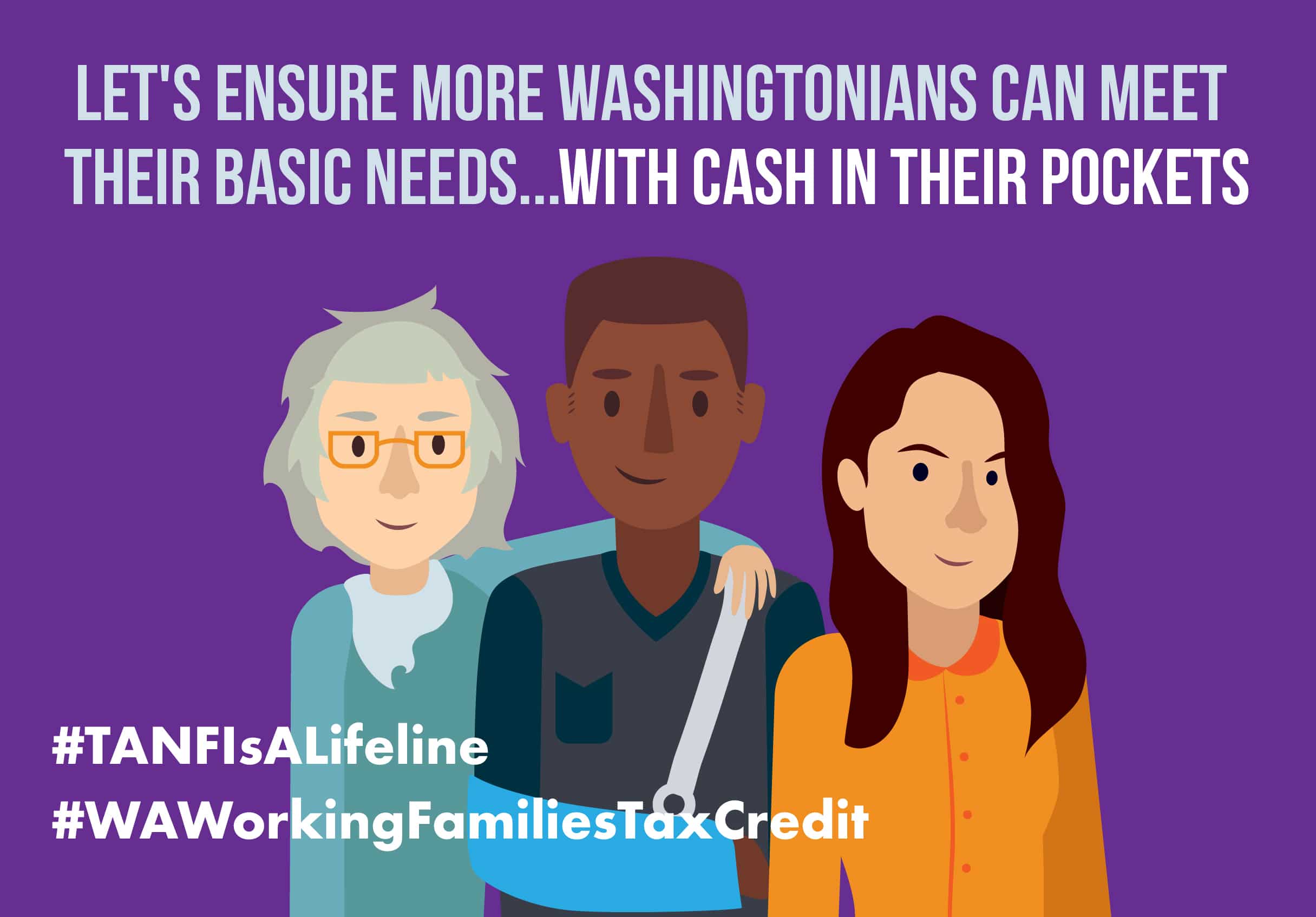Economic security programs are powerful and proven anti-poverty tools. Tax credits for working families, basic cash and food assistance, and housing subsidies make up a critical network of support for children, families, and elders across Washington state struggling to make ends meet. Programs like the Earned Income Tax Credit (EITC) – or our state version, the Working Families Tax Credit – and WorkFirst/Temporary Assistance for Needy Families (TANF) are essential to not only their direct recipients, but to every person in Washington state. They ensure support will be available if people fall on hard times, inject money into local economies, and strengthen our communities by reducing poverty and positioning kids and families to succeed over the long-term.
New Census data underscore the need to invest in income security through WorkFirst and tax credits to ensure that every person in our state — no matter who they are, where they live, or how much money they make — has the opportunity to thrive. Although the data show that Washington state experienced a small improvement in household income and a lower poverty rate in 20181– reflecting the economic growth of recent years – these improvements were not consistent across all Washington communities. In 2018, Latinx and Black Washingtonians were 2-3 times more likely than their white counterparts to struggle to make ends meet. While 8.2% of whites lived below the poverty line last year, 16.4% of Latinx people and 20% of Black people faced poverty in Washington state.2 While household income data show increases for most Washingtonians, Black households did not experience higher income in 2018. These trends reflect generations of racist policymaking (from segregation to treaty violations) and ongoing structural and institutional racism (from hiring and pay discrimination to deeply unequal schools) that stripped wealth and opportunity from people of color, and channeled resources to whites.

Washington’s economic growth has outpaced many other U.S. states, but the Census data make clear that those gains are not being shared broadly. Hardworking people across our state – Washingtonians who work jobs in the paid economy, as well as those doing vital but unpaid work (like caring for children, elders, and folks with disabilities) – help drive our Washington’s growth, and we all deserve to share in its prosperity.
Despite inequity, the good news is that our state leaders have effective tools they can leverage. Enacting a modern Working Families Tax Credit and reinvesting in WorkFirst/TANF offer two critical opportunities for Washington state policymakers to combat poverty and boost the incomes of thousands of households across our state.
The Working Families Tax Credit would provide an income boost to working people and their families in the form of a tax refund. This would put a meaningful amount back into the pockets of people with low and moderate incomes across our state – helping them to pay for the things they most need. Building off the success of the federal EITC – which lifts people out of poverty and improves health, education, and employment outcomes – the Working Families Tax Credit would extend the program to include many Washingtonians who are excluded at the federal level (like unpaid caregivers, immigrants, and some workers without kids). The credit would also move the needle on racial equity, as it would have outsized positive impacts in communities of color – who are overrepresented among the lowest-income, highest-taxed population in Washington state.
Another critical tool to support Washington’s families is WorkFirst/TANF. Through its cash assistance and supportive services, WorkFirst/TANF protects kids and families from experiencing more severe poverty. The program stabilizes families facing crises like homelessness and domestic violence, and over the long-term, helps kids do better in school and increases earning power in adulthood. But state policymakers have cut the program dramatically over the past decade, forcing thousands of families off of assistance and into deeper hardship – with particular harm to Black and American Indian and indigenous families. The legislature took a modest first step toward undoing harmful cuts in 2019, but lawmakers must fully roll back punitive Recession era policies to ensure that TANF is there when families need it.
The Working Families Tax Credit and WorkFirst/TANF – in tandem with other crucial programs like the Supplemental Nutrition Assistance Program (SNAP) and housing subsidies – complement one another to build a ladder that can support Washingtonians to transition into increased financial stability. And critically, both programs offer cash to families who need it. Direct financial assistance gives families needed flexibility to use the income in the ways that best help their household. This means diapers, medicine, clothing, bus fare, school supplies, utility payments, car repairs, and more.
Investments in effective programs like the Working Families Tax Credit and WorkFirst/TANF would move Washington closer to becoming a state where every person – regardless of who they are and where they work – has the resources they need to lead a healthy life, and the opportunity they need to thrive.
